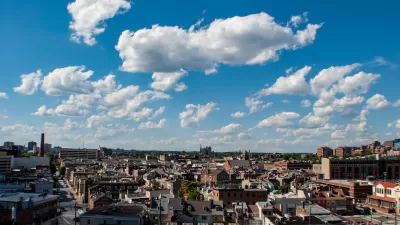The increased demand for walkable urban spaces could make them more and more exclusionary if cities don’t pursue policies to limit displacement and boost affordability.

As more people recognize and seek out the benefits of compact, walkable, communities, the desirability of these areas and the consequent rising housing costs threaten to put them out of reach for many American households without concerted efforts on the part of policymakers to preserve affordable housing, according to a report from Smart Growth America. Maria Rachal outlines the report’s findings for Smart Cities Dive.
While early pandemic pundits predicted the ‘death’ of urban areas, recent trends show that people—perhaps more than ever—value the benefits of compact development and easily accessible amenities and services. But “Demand drives up costs and can reduce low- and moderate-income households’ opportunity to live in highly walkable areas,” the report warns.
“The organizations that produced the report stated that 19.1% of the total U.S. real GDP and 6.8% of the nation’s population are in walkable urban places that cover 1.2% of the total land mass of the top 35 metro areas.” Yet many localities prevent dense development through their zoning codes. “To spur walkability and equitable access to walkable areas, cities can advance zoning reform, foster non-car transportation options, preserve and invest in affordable housing, and plan for walkable neighborhoods to be resilient to climate impacts, the report states.”
FULL STORY: Walkable urban areas are popular but have an affordability problem: report

Planetizen Federal Action Tracker
A weekly monitor of how Trump’s orders and actions are impacting planners and planning in America.

Maui's Vacation Rental Debate Turns Ugly
Verbal attacks, misinformation campaigns and fistfights plague a high-stakes debate to convert thousands of vacation rentals into long-term housing.

Restaurant Patios Were a Pandemic Win — Why Were They so Hard to Keep?
Social distancing requirements and changes in travel patterns prompted cities to pilot new uses for street and sidewalk space. Then it got complicated.

Charlottesville Temporarily Has No Zoning Code
A judge ordered the Virginia city to throw out its newly revised zoning code, leaving permitting for new development in legal limbo.

In California Battle of Housing vs. Environment, Housing Just Won
A new state law significantly limits the power of CEQA, an environmental review law that served as a powerful tool for blocking new development.

Boulder Eliminates Parking Minimums Citywide
Officials estimate the cost of building a single underground parking space at up to $100,000.
Urban Design for Planners 1: Software Tools
This six-course series explores essential urban design concepts using open source software and equips planners with the tools they need to participate fully in the urban design process.
Planning for Universal Design
Learn the tools for implementing Universal Design in planning regulations.
Heyer Gruel & Associates PA
JM Goldson LLC
Custer County Colorado
City of Camden Redevelopment Agency
City of Astoria
Transportation Research & Education Center (TREC) at Portland State University
Jefferson Parish Government
Camden Redevelopment Agency
City of Claremont





























